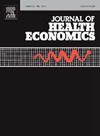阿片类药物与住房危机之间毁灭性的共舞:奥施康定重新配方的证据。
IF 3.6
2区 经济学
Q1 ECONOMICS
引用次数: 0
摘要
住房不稳定和药物滥用是美国最紧迫的两大挑战,各自都对健康和社会造成了深远的影响。阿片类药物危机在多大程度上加剧了住房的不稳定性,这是一个至关重要但在很大程度上尚未得到充分探讨的问题。我们的研究对这一相对未知的关系进行了探索,调查了在美国阿片类药物流行的关键时刻,奥施康定(OxyContin)的重新配制是如何影响驱逐率的。我们采用剂量反应差分模型,分析了 2004 年至 2016 年的驱逐数据,结果表明奥施康定的重新配制导致驱逐率大幅上升,尤其是在驱逐保护薄弱或获得精神治疗资源有限的地区。渠道分析表明,改制后,吸食大麻的人数增加,身心健康问题加剧。此外,奥施康定的重新配制导致了对补充营养援助计划的更大依赖,标志着政府资源的财政压力升级。最后,我们发现有证据表明,改制后婚姻破裂的情况有所增加。我们的研究结果突出表明,公共卫生和住房管理部门迫切需要通力合作,共同应对阿片类药物危机和住房危机。本文章由计算机程序翻译,如有差异,请以英文原文为准。
The devastating dance between opioid and housing crises: Evidence from OxyContin reformulation
Housing instability and drug misuse are two of the United States' most pressing challenges, each bearing profound health and societal consequences. A crucial yet largely underexplored question is the extent to which the opioid crisis has intensified housing instability. Our study ventures into this relatively uncharted nexus, investigating how the OxyContin reformulation, a pivotal moment in the U.S. opioid epidemic, impacted eviction rates. Employing a dose-response Difference-in-Differences model and analyzing eviction data from 2004 to 2016, we demonstrate that the OxyContin reformulation precipitated a significant increase in evictions, especially in areas with weak eviction protections or limited access to psychiatric treatment resources. Channel analyses reveal increased marijuana initiation and heightened mental and physical health issues following the reformulation. Moreover, the OxyContin reformulation leads to greater reliance on the Supplemental Nutrition Assistance Program, signaling an escalated financial strain on governmental resources. Finally, we find evidence of increased marital disruption post-reformulation. Our findings underscore the urgent need for collaborative efforts between public health and housing authorities to address both the opioid and housing crises.
求助全文
通过发布文献求助,成功后即可免费获取论文全文。
去求助
来源期刊

Journal of Health Economics
医学-卫生保健
CiteScore
6.10
自引率
2.90%
发文量
96
审稿时长
49 days
期刊介绍:
This journal seeks articles related to the economics of health and medical care. Its scope will include the following topics:
Production and supply of health services;
Demand and utilization of health services;
Financing of health services;
Determinants of health, including investments in health and risky health behaviors;
Economic consequences of ill-health;
Behavioral models of demanders, suppliers and other health care agencies;
Evaluation of policy interventions that yield economic insights;
Efficiency and distributional aspects of health policy;
and such other topics as the Editors may deem appropriate.
 求助内容:
求助内容: 应助结果提醒方式:
应助结果提醒方式:


